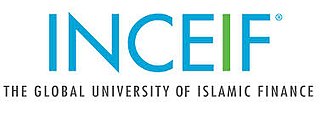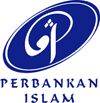
Islamic banking, Islamic finance, or Sharia-compliant finance is banking or financing activity that complies with Sharia and its practical application through the development of Islamic economics. Some of the modes of Islamic banking/finance include Mudarabah, Wadiah (safekeeping), Musharaka, Murabahah (cost-plus), and Ijara (leasing).

The Central Bank of Malaysia is the Malaysian central bank. Established on 26 January 1959 as the Central Bank of Malaya, its main purpose is to issue currency, act as banker and adviser to the government of Malaysia and regulate the country's financial institutions, credit system and monetary policy. Its headquarters is located in Kuala Lumpur, the federal capital of Malaysia.

RHB Bank Berhad is a Malaysian bank based in Kuala Lumpur and founded in 1994. It is one of the largest banks in Malaysia.

Lembaga Tabung Haji (Jawi: تابوڠ حاج ; Arabic صندوق الحج) also known as Tabung Haji or TH is the Malaysian hajj pilgrims fund board. It was formerly known as Lembaga Urusan dan Tabung Haji (LUTH). The main headquarters is located at Tabung Haji Tower, Jalan Tun Razak, Kuala Lumpur. Tabung Haji facilitates savings for the pilgrimage to Mecca through investment in Shariah-compliant vehicles. Through its subsidiaries, the company also engaged in other industries such as finance, hospitality, property, plantation and information technology.

AmBank Group comprises AMMB Holdings Berhad is one of the largest banking groups in Malaysia whose core businesses are retail banking, wholesale banking, Islamic banking, and life and general insurance.

CIMB Group Holdings Berhad is a Malaysian universal bank headquartered in Kuala Lumpur and operating in high growth economies in ASEAN. CIMB Group is an indigenous ASEAN investment bank. CIMB has a wide retail branch network with 1,080 branches across the region.

Citibank Berhad is a licensed commercial bank operating in Malaysia with its headquarters in Jalan Ampang, Kuala Lumpur. Citibank Berhad operates as a subsidiary of Citigroup Holding (Singapore) Private Limited, commencing its banking operations in Malaysia since 1959. Citibank Berhad was locally incorporated in 1994. Citibank Berhad has 11 branches spread across Kuala Lumpur, Selangor, Penang, Kuantan, Malacca and Johor, offering a wide range of banking and financial services including retail banking, institutional banking, and investment products and services.

The International Center for Education in Islamic Finance (INCEIF) UNIVERSITY is a Malaysian Islamic university established in 2005 by Bank Negara Malaysia in human capital for the Islamic finance industry. Commonly known as the Global University of Islamic Finance.
A Sharia Board certifies Islamic financial products as being Sharia-compliant. Because compliance with Sharia law is the underlying reason for the existence of Islamic finance, Islamic banks should establish a Sharia Supervisory Board (SSB) to advise them on whether their products comply, and to ensure that their operations and activities comply with Sharia principles. There are also national Sharia boards in many Muslim majority countries that regulate Islamic financial institutions nationwide.
Banking or banking activity that complies with Sharia —known as Islamic banking and finance, or Sharia-compliant finance—has its own products, services and contracts that differ from conventional banking. Some of these include Mudharabah, Wadiah (safekeeping), Musharakah, Murabahah, Ijar (leasing), Hawala, Takaful, and Sukuk.

The Prime Minister's Department is a federal government ministry in Malaysia. Its objective is "determining the services of all divisions are implemented according to policy, legislation / regulations and current guidelines". It is headed by the Prime Minister of Malaysia followed by other Minister in the Prime Minister's Department. The Department consists of the Prime Minister's Office, the Deputy Prime Minister's Office and more than 50 other government agencies and entities. The Prime Minister's Department was established on July 1957. Its headquarters are in Perdana Putra, Putrajaya.

The Ministry of Finance, abbreviated MOF, is a ministry of the Government of Malaysia that is charged with the responsibility for government expenditure and revenue raising. The ministry's role is to develop economic policy and prepare the Malaysian federal budget. The Ministry of Finance also oversees financial legislation and regulation. Each year in October, the Minister of Finance presents the Malaysian federal budget to the Parliament.
The Malaysia International Islamic Financial Centre (MIFC) is an initiative of Malaysia’s financial market regulators and relevant government agencies dedicated to developing Malaysia’s Islamic finance market by engaging with industry and government. The initiative was launched in 2006 and is based in Kuala Lumpur, Malaysia.

Asia School of Business(ASB) is a business school and one of the most prestigious and selective in Malaysia, located in Kuala Lumpur. ASB offers MBA, EMBA and Master in Central Banking (MCB) programs.
International Shariʽah Research Academy for Islamic Finance (ISRA) is an Islamic finance research institution in Malaysia that focuses on sharia-related issues

Rusni Hassan currently is a Professor and Dean at IIUM Institute of Islamic Banking and Finance, International Islamic University Malaysia. Previously, she was a Deputy Dean at the Institute, a Coordinator for Research and Publication and Course Coordinator for Islamic Law of Transactions and Islamic Banking and Takaful. She was a Research Committee for Review of Islamic Banking Laws, Central Bank of Malaysia and an examiner for Financial Planner Association of Malaysia. Presently she is the examiner for the Chartered Institute of Management Accountants. She was a member of Shariah Advisory Council Bank Negara Malaysia and Shariah Advisor for Association of Islamic Banking Institutions Malaysia. She also served as Secretary for the Association of Shariah Advisors in Islamic Finance Malaysia for 8 years starting from 2012 until 2020.

Dr. Shariq Nisar is an Indian finance professional, academic and activist. He received PhD in economics from Aligarh Muslim University, one of the oldest universities in India. He co-founded TASIS, a shariah advisory institution, related to finance, based in Mumbai, that screens stocks for Shariah compliance. His first major work was the launch of India's first Shariah Index in association with the Bombay Stock Exchange. Later on he worked with the National Stock Exchange to launch Shariah index for them. He is advisor to Kerala Government's Islamic Finance venture Cheraman Financial Services Ltd. He also helped Government of India owned General Insurance Corporation of India establish its Retakaful division in 2009. During 2013 and 2014, he served as a senior visiting fellow at Harvard Law School. He was invited to share his views before the Select Committee of Indian Parliament on the Insurance Laws (Amendment) Bill (2015). He served as a non-executive independent director at Octaware Technologies from November, 2015 to December 2018, India's first shariah compliant publicly listed company. Dr. Nisar has also authored various books in the area of Islamic Finance with International as well as Indian perspectives. He has been awarded Bharat Inclusion Research Fellowship 2020.
Islamic banking and finance — the industry built around avoiding interest and other financial practices found in violation of sharia — has been both praised and criticized by observers.
Nor Shamsiah binti Mohd Yunus was the 9th Governor of the Central Bank of Malaysia from 2018 to 2023, replacing Tan Sri Muhammad bin Ibrahim. She served as Deputy Governor of Bank Negara from 2010 to 2013 and from 2013 to 2016. Later, she joined the International Monetary Fund as Assistant Director of the Financial and Capital Markets Division.












